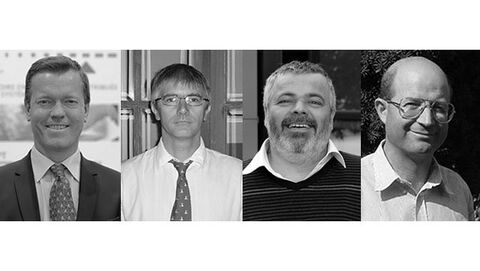
4 teacher-researchers in the "Top 2% Scientists
Four of the University's faculty researchers are among the top 2% of scientists cited in the world.
Top 2% Scientists" ranking
The 2020 "Top 2% Scientists" ranking of the world's most cited scientists has just been released. It is published by researchers at Stanford University and is authoritative.
By examining the number of scientific publications by each researcher and the number of citations of those publications that are included in the publications of other researchers, this study analyzed data from 1996 to 2019 covering approximately 7 million scientists around the world.
The top 2% ranking includes nearly 160,000 scientists in 22 scientific fields and 176 subcategories.
There are 4 professors from our university, which confirms the quality of scientific research conducted at the UPHF.
Thierry-Marie Guerra, Damien Trenteseaux and Frédéric Vanderhaegen (LAMIH UMR CNRS 8201) are ranked in the "Industrial Engineering and Automation" category, Serge Nicaise (LAMAV) in the "Mathematics" category.
The University congratulates them for this well-deserved worldwide recognition!
Details of the activities of Thierry-Marie Guerra
Thierry-Marie Guerra is Professor of Automatic Control. Since July 2020 he is a member of the Technical Council of IFAC (International Federation of Automatic Control) as Chair of the Coordination Committee - Computers, Cognition and Communication. From 2014 to 2020 he was the Chair of the Technical Committee 3.2 "Computational Intelligence in Control" of IFAC. He is an associate editor of the international journals Fuzzy Sets & Systems and IEEE Transactions on Fuzzy Systems. His fields of research and activities are wine, hard rock, stamps, nonlinear control, observation and control of quasi-linear systems with Variable Parameters, LMI constraints, Lyapunov functions ... with applications to mobility, disability and flexible robots.

Details of Serge Nicaise's activities
Serge Nicaise's research activities are oriented towards Partial Differential Equations, Numerical Analysis and PDE control. More precisely, his work focuses on the study of boundary problems posed on non-regular domains (open with corners and/or edges, networks, multi-structures, etc); on associated Numerical Analysis problems, on spectral theory and finally on the theory of control and stabilization of distributed systems. His results have many applications in mechanics, automation and electromagnetism for example.

Details of Damien Trentesaux's activities
Damien Trentesaux conducts his research activity in the automatic department of LAMIH UMR CNRS 8201 in the field of industrial cyber-physical systems (CPS). CPS aim at interconnection and functional augmentation of physical systems by digital capabilities. The contributions focus on the design of industrial CPS architectures composed of autonomous entities (equipment, vehicle, robot, product...) interacting with humans. Particular attention is paid to environmental and societal issues. This work, carried out in collaboration with industrialists, has applications in production, logistics and transport. "Even if this ranking is by name, it is the result of teamwork within the laboratory with all the actors of research in the field of industrial engineering. This ranking would not exist without this teamwork" Damien Trentesaux.
Photo credit: Samuel Dhote

Details of Frédéric Vanderhaegen's activities
Frédéric Vanderhaegen was a researcher at CNRS from 1995 to 2005 after his PhD thesis in industrial and human automation and a postdoctoral project in Ispra, Italy. For 10 years, he led the Human Machine Systems (SHM) team at LAMIH where he has been conducting his research activities since 2005 as a Professor. He is now President of the Research Group on Integrated Automation and SHM (GRAISyHM). He leads the Human Factors cluster of the European Network of Excellence in Railway Research (EURNEX), is co-chairman in charge of Training in the technical committee on SHM of the International Federation of Automation (IFAC) after having been its chairman. His research topics include SHMs, learning systems, human reliability, human-machine cooperation, resilience engineering, human-systems inclusion and dissonance, transportation and industrial systems.

